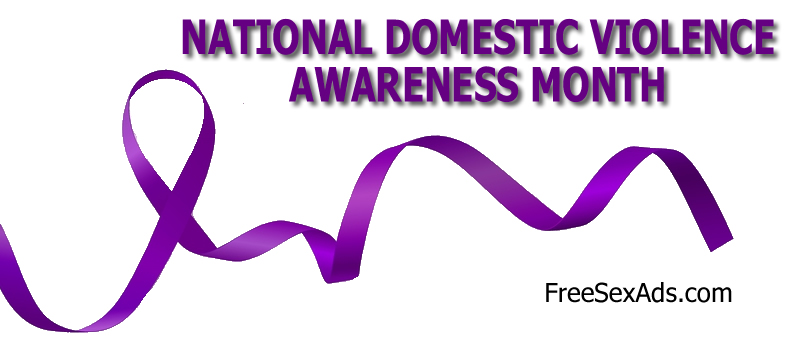Domestic Violence Awareness Month
 October is National Domestic Violence Awareness Month in the United State. This is a time dedicated to recognizing the widespread impact of domestic violence and empowering individuals and communities to take action against it. BonePage.com proudly stands in solidarity with survivors, recognizing National Domestic Violence Awareness Month, and invites our members and visitors to become part of the solution. Together, we can create an environment of support, understanding, and, ultimately, change.
October is National Domestic Violence Awareness Month in the United State. This is a time dedicated to recognizing the widespread impact of domestic violence and empowering individuals and communities to take action against it. BonePage.com proudly stands in solidarity with survivors, recognizing National Domestic Violence Awareness Month, and invites our members and visitors to become part of the solution. Together, we can create an environment of support, understanding, and, ultimately, change.
History of National Domestic Violence Awareness Month
National Domestic Violence Awareness Month originated from the Day of Unity in October 1981, which was created by the National Coalition Against Domestic Violence. Its primary aim was to connect advocates from across the country who were working to end violence against women and their children. This day eventually expanded into a full week of activities, and by 1987, it grew into a month-long observance. In 1989, Congress officially designated October as National Domestic Violence Awareness Month, bringing nationwide attention to the issue and establishing it as a time for education, remembrance, and action.
The Prevalence of Domestic Violence in the United States
 Domestic violence is a pervasive issue that affects millions of individuals across the United States. According to the National Coalition Against Domestic Violence (NCADV), about one in four women and one in nine men experience severe intimate partner physical violence, sexual violence, or stalking that has significant effects on their lives, such as injury or trauma. The true prevalence of domestic violence is even higher, as many cases go unreported due to fear, stigma, or lack of support.
Domestic violence is a pervasive issue that affects millions of individuals across the United States. According to the National Coalition Against Domestic Violence (NCADV), about one in four women and one in nine men experience severe intimate partner physical violence, sexual violence, or stalking that has significant effects on their lives, such as injury or trauma. The true prevalence of domestic violence is even higher, as many cases go unreported due to fear, stigma, or lack of support.
Domestic violence does not discriminate—it occurs across all demographics, regardless of age, race, socioeconomic status, or gender. The impact on children who witness domestic violence is profound and long-lasting, often leading to emotional and psychological challenges later in life. It’s important to acknowledge that this issue is not a private matter but a societal one, requiring collective action.
Injuries, Trauma & Deaths Associated with Domestic Abuse
 Domestic violence is not only damaging in terms of physical and emotional abuse; it also leads to unintentional deaths. It is estimated that each year in the United States, around 2,000 people lose their lives due to domestic violence. These deaths include intimate partner homicides, murder-suicides, and accidental injuries sustained during violent altercations. Many of these tragedies could be prevented if more support, resources, and protections were available for survivors at risk.
Domestic violence is not only damaging in terms of physical and emotional abuse; it also leads to unintentional deaths. It is estimated that each year in the United States, around 2,000 people lose their lives due to domestic violence. These deaths include intimate partner homicides, murder-suicides, and accidental injuries sustained during violent altercations. Many of these tragedies could be prevented if more support, resources, and protections were available for survivors at risk.
Domestic violence often leaves victims with not only physical injuries but also deep emotional scars. The trauma experienced in abusive relationships can lead to lasting effects, including traumatic stress, anxiety, and depression. Victims may suffer from chronic fear, experience difficulty trusting others, or face overwhelming feelings of helplessness. Emotional abuse, which can be as damaging as physical harm, often leaves individuals questioning their own self-worth, feeling isolated, and struggling with shame. The long-term consequences of domestic violence extend beyond visible wounds, affecting mental health and well-being long after the abuse has ended. Survivors must seek support to heal from both the physical and emotional impacts of such violence.
Stigma and Barriers to Getting Help
Domestic violence is shrouded in stigma, which acts as a significant barrier to victims seeking the help they need. The fear of not being believed, the social shame attached to admitting abuse, and the emotional manipulation of abusers all play roles in keeping victims silent. Many feel that they may be judged for remaining in an abusive relationship, while others may be economically dependent on their abuser, making it difficult to break free.
Another significant barrier is the fear of escalation. Victims may hesitate to report abuse or leave their partner due to the fear that the violence will worsen. Emotional abuse—though not leaving physical marks—can be particularly damaging, leading victims to feel worthless, isolated, and without options.
Examples of Domestic Violence
Domestic violence comes in many forms, ranging from physical and sexual abuse to emotional and psychological manipulation. Emotional abuse often includes gaslighting, constant criticism, threats, isolation from family and friends, and the undermining of a person’s self-worth. Financial abuse is another aspect, where the abuser controls or restricts access to money, rendering the victim financially dependent and powerless.
The complexity of domestic violence means that it may not always be immediately recognizable, especially when the abuse is not physical. Emotional abuse can be as damaging as physical violence, leading victims to question their reality and lose confidence in their ability to change their circumstances.
You Are Not Alone – Help Is Available
 If you or someone you know is experiencing domestic violence, it is important to know that you are not alone. Help is available, and there are people and resources ready to provide support.
If you or someone you know is experiencing domestic violence, it is important to know that you are not alone. Help is available, and there are people and resources ready to provide support.
Call 911 for Immediate Assistance
If you are a victim of domestic violence or witness someone in immediate danger, do not hesitate to seek help. In the United States, call 911 right away if you or someone else is facing an urgent threat to safety. Your safety is the priority—help is available 24/7, and you don’t have to face this alone.
Online Resources
- The National Domestic Violence Hotline: Visit thehotline.org or call 1-800-799-SAFE (7233). This hotline provides 24/7 confidential support and information for victims, survivors, and their friends and family. You can also text “START” to 88788 to connect with an advocate.
- Love Is Respect: Visit loveisrespect.org or text “LOVEIS” to 22522 for support, particularly for young adults and teenagers experiencing abusive relationships.
- The National Coalition Against Domestic Violence (NCADV): Visit ncadv.org for resources, education, and advocacy efforts to end domestic violence.
211 Phone Services
For those seeking assistance in the United States, 211 is a valuable resource that can help connect individuals to the services they need. By dialing 211, callers can receive information on domestic violence shelters, counseling services, legal support, and other community-based resources. This free, confidential service is available 24/7 and can provide localized support tailored to your needs.
Join Us in Being Part of the Solution
National Domestic Violence Awareness Month is a call to action. It’s a time to reflect on the impact of domestic violence and take meaningful steps to prevent it. At FreeSexAds.com, we believe in maintaining a safe and supportive environment for everyone. By raising awareness, educating ourselves, and supporting those who need it, we can work together to bring an end to domestic violence.
If you or someone you care about needs help, reach out. You are not alone, and there is hope for a better future.
Brianna Knight, First Amendment Reporter
 Brianna Knight is a dedicated and insightful First Amendment reporter and blogger based in Indianapolis, Indiana. Knight is a published author with a passion for writing. She brings a unique perspective to her coverage of news stories affecting sex workers and the adult entertainment industry. She keeps a close watch on free speech laws and the impact of new policies and initiatives on the rights of sex workers and the adult entertainment industry.
Brianna Knight is a dedicated and insightful First Amendment reporter and blogger based in Indianapolis, Indiana. Knight is a published author with a passion for writing. She brings a unique perspective to her coverage of news stories affecting sex workers and the adult entertainment industry. She keeps a close watch on free speech laws and the impact of new policies and initiatives on the rights of sex workers and the adult entertainment industry.
Contact Brianna Knight: BriannaKnight@FreeSexAds.com
More FreeSexAds.com Articles

